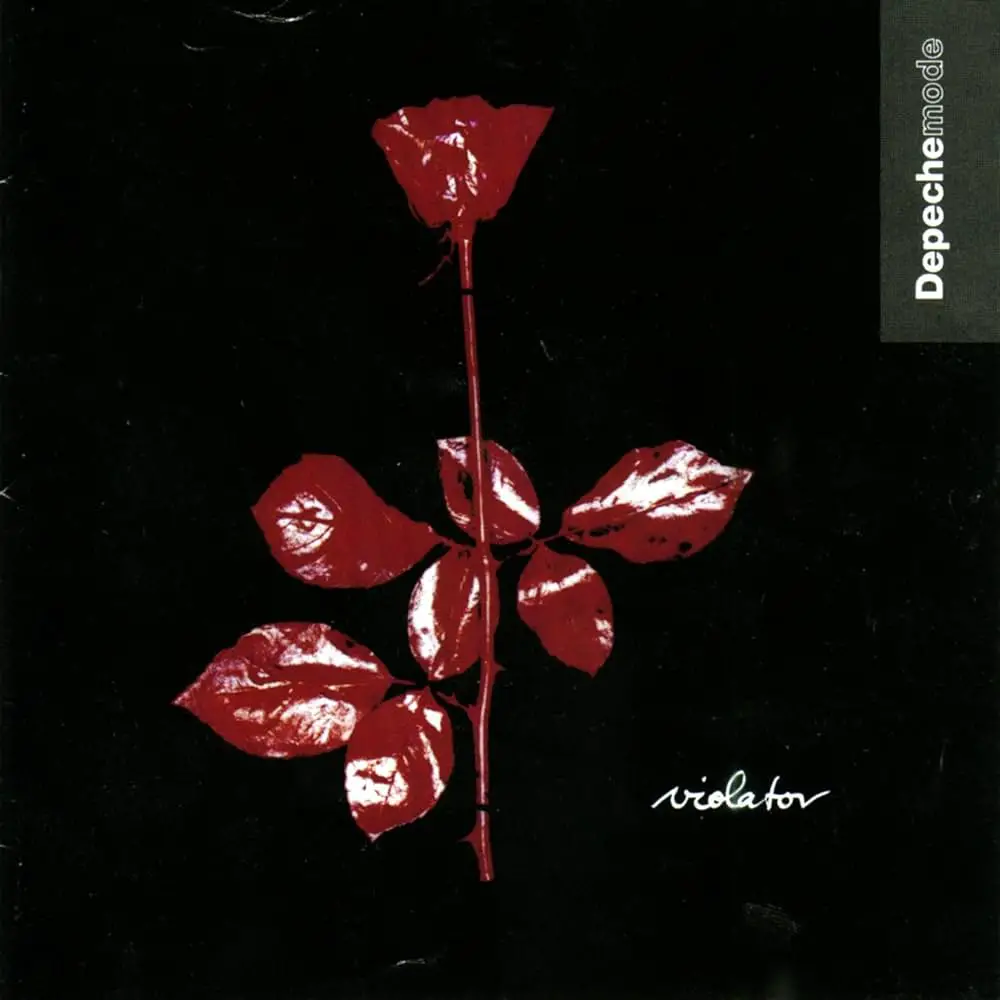History and Development of Violator
Depeche Mode’s journey to ‘Violator’ was a culmination of their evolution as a band. Formed in 1980 in Basildon, Essex, England, the band initially emerged from the synth-pop scene. Comprised of Vince Clarke, Andy Fletcher, Martin Gore, and Dave Gahan, Depeche Mode quickly gained a following with their distinctive blend of electronic beats and emotive lyrics. Over the years, they honed their sound, experimenting with new technologies and pushing the boundaries of electronic music. By the late 1980s, they had established themselves as one of the most innovative bands of their generation, paving the way for the electronic music revolution that would dominate the 1990s.
What Inspired the Album
‘Violator’ was born from a blend of personal experiences and external influences. The band members, particularly Martin Gore, drew inspiration from their own lives, exploring themes of love, desire, and existential angst. Gore’s introspective lyrics reflected his own struggles with addiction and depression, adding a raw honesty to the album’s emotional landscape. Additionally, the socio-political climate of the late 1980s and early 1990s seeped into their music, infusing it with a sense of urgency and introspection. From the pressures of fame to the complexities of human relationships, ‘Violator’ delved into the depths of the human psyche with unflinching honesty.
Key Themes
Love and Longing
At its core, ‘Violator’ is a testament to the complexities of love and longing. Tracks like “Enjoy the Silence” and “Policy of Truth” capture the tumultuous nature of relationships, oscillating between desire and disillusionment. The album’s lyrics delve into the intricacies of human connection, exploring themes of intimacy, betrayal, and redemption. Through haunting melodies and evocative lyrics, Depeche Mode invites listeners into a world of passion and pain, where love is both a source of joy and torment.
Dark Eroticism
‘Violator’ is imbued with a sense of dark eroticism, exploring the intersection of pleasure and pain. Songs like “World in My Eyes” and “Blue Dress” evoke a visceral sensuality, inviting listeners into a world of forbidden desires and hidden fantasies. This exploration of taboo subjects adds depth and nuance to the album, challenging societal norms and conventions. With its hypnotic beats and seductive vocals, ‘Violator’ serves as a soundtrack to the darker aspects of human desire, enticing listeners with its intoxicating allure.
Existential Angst
Underlying the album’s glossy exterior is a sense of existential angst. Tracks such as “Personal Jesus” and “Halo” grapple with themes of faith, identity, and mortality. The lyrics are steeped in ambiguity, inviting listeners to ponder the meaning of life and their place in the universe. This existential introspection adds a layer of complexity to ‘Violator,’ elevating it beyond mere pop music. Through introspective lyrics and atmospheric melodies, Depeche Mode confronts the existential void with unflinching resolve, challenging listeners to confront their own mortality.
Track Listing and Commentary
- World in My Eyes Opening with pulsating synths and driving beats, “World in My Eyes” sets the tone for the album. Lyrically, it explores themes of desire and escapism, inviting listeners into a world of sensory overload. The song’s infectious energy and catchy hooks make it a standout track, setting the stage for the emotional journey that lies ahead.
- Sweetest Perfection A haunting ballad with ethereal melodies, “Sweetest Perfection” delves into the allure of addiction and self-destruction. The juxtaposition of beauty and darkness creates a sense of unease, drawing listeners into its hypnotic embrace. With its haunting vocals and atmospheric production, it’s a standout track that lingers in the mind long after it’s ended.
- Personal Jesus Perhaps one of Depeche Mode’s most iconic tracks, “Personal Jesus” is a powerhouse of raw energy and infectious grooves. With its catchy chorus and provocative lyrics, it’s a timeless anthem of rebellion and redemption. The song’s driving rhythms and electrifying guitar riffs make it a staple of the band’s live performances, captivating audiences with its raw intensity.
- Halo “Halo” exudes a sense of otherworldly beauty, with its shimmering synths and haunting vocals. Lyrically, it explores the dichotomy of light and darkness, offering a glimpse into the complexities of human nature. The song’s ethereal melodies and hypnotic rhythms create a sense of transcendence, transporting listeners to a realm of pure emotion and introspection.
- Waiting for the Night A brooding ballad tinged with melancholy, “Waiting for the Night” is a meditation on solitude and introspection. Its atmospheric soundscape evokes a sense of quiet contemplation, inviting listeners to lose themselves in its haunting beauty. The song’s haunting vocals and evocative lyrics make it a standout track, capturing the essence of longing and yearning with raw intensity.
- Enjoy the Silence Arguably one of Depeche Mode’s most iconic tracks, “Enjoy the Silence” is a masterpiece of electronic music. Its soaring melodies and poignant lyrics capture the fleeting nature of happiness, urging listeners to embrace the quiet moments in life. The song’s infectious hooks and mesmerizing production make it a timeless classic, resonating with audiences across generations.
- Policy of Truth With its pulsating rhythms and infectious hooks, “Policy of Truth” is a standout track on ‘Violator.’ Lyrically, it explores the complexities of honesty and deception, challenging listeners to confront uncomfortable truths. The song’s driving beats and electrifying synths make it a highlight of the album, capturing the band at the peak of their creative powers.
- Blue Dress A hauntingly beautiful ballad, “Blue Dress” exudes a sense of longing and desire. Its ethereal melodies and evocative lyrics paint a vivid portrait of forbidden love, leaving a lingering impression on the listener. The song’s haunting vocals and atmospheric production make it a standout track, capturing the essence of desire and yearning with raw emotion.
- Clean Closing the album on a poignant note, “Clean” is a cathartic journey of redemption and renewal. Its sweeping melodies and introspective lyrics offer a glimmer of hope amidst the darkness, leaving listeners with a sense of catharsis. The song’s haunting vocals and atmospheric production make it a fitting conclusion to the emotional journey of ‘Violator.’
Significant Reviews
‘Violator’ received widespread acclaim upon its release, with critics praising its innovative sound and provocative lyrics. Rolling Stone hailed it as “a masterpiece of modern music,” while Pitchfork lauded its “sensual and sophisticated” approach to electronic music. The album’s commercial success was equally impressive, cementing Depeche Mode’s status as one of the most influential bands of their generation. With its haunting melodies and evocative lyrics, ‘Violator’ continues to captivate audiences with its raw intensity and timeless appeal.
Similar Depeche Mode Albums
Looking for more music like Depeche Mode’s iconic sound? Explore these albums that capture the essence of their unique style and innovation.
1. ‘Music for the Masses’ (1987)
- Overview: Released before ‘Violator,’ ‘Music for the Masses’ is another pivotal album in Depeche Mode’s discography. It marked a shift towards darker themes and a more mature sound.
- Key Tracks: “Never Let Me Down Again,” “Strangelove,” “Behind the Wheel”
2. ‘Black Celebration’ (1986)
- Overview: ‘Black Celebration’ showcases Depeche Mode delving deeper into themes of darkness and despair. It’s a moody and atmospheric album that laid the groundwork for their later work.
- Key Tracks: “Stripped,” “A Question of Time,” “Black Celebration”
3. ‘Songs of Faith and Devotion’ (1993)
- Overview: Following the success of ‘Violator,’ ‘Songs of Faith and Devotion’ pushed Depeche Mode’s sound even further, incorporating elements of rock and gospel.
- Key Tracks: “I Feel You,” “Walking in My Shoes,” “In Your Room”
4. ‘Ultra’ (1997)
- Overview: ‘Ultra’ marked a return to form for Depeche Mode after a period of uncertainty. It’s a dark and introspective album that reflects the band’s resilience and evolution.
- Key Tracks: “Barrel of a Gun,” “It’s No Good,” “Home”
5. ‘Delta Machine’ (2013)
- Overview: ‘Delta Machine’ finds Depeche Mode exploring new sonic territory while staying true to their signature sound. It’s a gritty and atmospheric album that showcases the band’s continued relevance.
- Key Tracks: “Heaven,” “Soothe My Soul,” “Should Be Higher”
List of Similar Albums
- The Cure – Disintegration: A seminal work in the gothic rock genre, ‘Disintegration’ explores themes of love, loss, and existential despair with haunting beauty.
- New Order – Power, Corruption & Lies: New Order’s second studio album, ‘Power, Corruption & Lies,’ is a landmark in electronic music. With its infectious beats and introspective lyrics, it remains a cornerstone of the genre.
- Joy Division – Unknown Pleasures: A haunting debut album that captures the raw energy and existential angst of post-punk. Its stark lyrics and atmospheric soundscapes continue to resonate with audiences today.
Unravel the layers of emotion and innovation within Depeche Mode’s ‘Violator,’ a timeless masterpiece that continues to captivate audiences with its raw intensity and haunting beauty.

